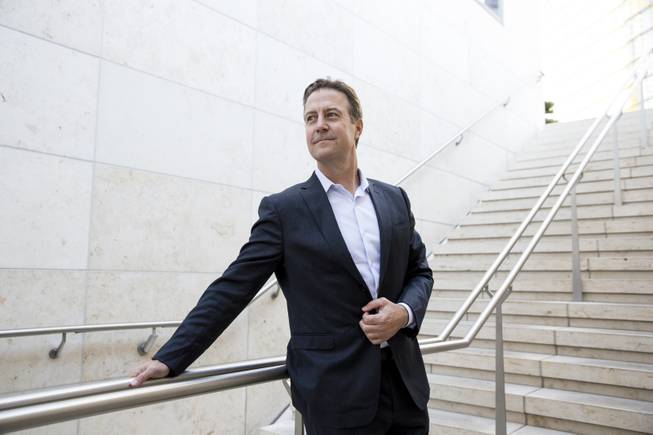
Bo Bernhard, Executive Director of International Gaming Institute at UNLV’s Harrah College of Hospitality poses for a photo Nov. 9, 2017.
Sunday, Nov. 26, 2017 | 2 a.m.
About the institute
The UNLV International Gaming Institute, founded in 1993, provides research and education to public, private and nonprofit sectors around the world. It features the Center for Gaming Innovation, the International Center for Gaming Regulation, the Hospitality Lab and the Esports Lab.
Around the world in a year. That’s how far Bo Bernhard, the engaging 44-year-old executive director of the UNLV International Gaming Institute, goes to answer clarion calls — he terms them “bat signals” — that beckon him.
Some are plaintive cries for help. During a July 4 break with relatives in the Midwest, his presence was requested in Chile. Hours earlier, a man had snapped, shooting and killing two workers, wounding six others, in the Monticello Casino near Santiago. Bernhard, a fifth-generation Nevadan, flew home to Las Vegas on July 5 and took a flight to South America the next day.
Two Monticello executives, Jaime Wilheim and Mariela Huenchumilla, welcomed him. They had met Bernhard at the institute’s elite International Conference on Gambling & Risk Taking last year at the Mirage. The Monticello killer “(had) said, ‘Lo siento’ — I’m sorry — apologizing to the dealer that he was about to shoot,” Bernhard said. “He hadn’t lost. He was a well-liked customer. But for some reason …”
Comprehending gaming’s potential link to such calamity soon came into play much closer to home. Stephen Paddock, who, from his Mandalay Bay perch, killed 58 and wounded hundreds at an Oct. 1 concert, was known as a successful high-stakes gambler. Bernhard has met with various authorities, industry executives and government officials to cull answers, but he is restricted from discussing those details. He hopes a Stanford neuropathologist’s analysis of Paddock’s brain will reveal clues about his behavior.
At the International Gaming Institute in the Stan Fulton Building on Flamingo Road the day after the massacre, Bernhard conducted a conference with gaming regulators from eight states that included A.G. Burnett, chairman of the Nevada Gaming Control Board. It had been on the docket, in conjunction with that week’s Global Gaming Expo. Still, because of events, Bernhard was grateful that Burnett kept his commitment to attend.
“The agenda changed,” said Bernhard, who again could not divulge details. “A painful educational moment, but good systems are in place. Everybody learned something, and I think each of those states got a little bit safer that day.”
Gov. Brian Sandoval vowed, in his 2013 State of the State address, to work with the International Gaming Institute to grow it into “the global intellectual hub” for gaming. Bernhard has traveled with Sandoval to Australia to represent the state on a trade mission and delivered a keynote address this year to industry leaders Down Under. He has translated for Sandoval while meeting with top gaming regulators in Chile and Peru. He has advised South Africa on the evolution of its resort-casino infrastructure. He has assisted with Japan’s plans for a $12 billion skyscraper to be developed by Las Vegas companies.
Bernhard will be the keynote speaker at upcoming functions in Miami and Vancouver. In London early next year, he will attend Europe’s largest gaming conference.
Bill Eadington, a mentor who succumbed to cancer in 2013, would be proud. The UNR economics professor pioneered the academic study of gambling. He advised Bernhard to build a diverse, multidisciplinary team to condense a complex gaming world and better address issues.
“As a team-sport athlete, that made sense to me — and it has inspired the construction of this special group,”
Bernhard said.
At Harvard, where he played baseball and soccer, Bernhard’s honors thesis was awarded magna cum laude, and he graduated with a double-major in sociology and psychology. He earned a master’s degree and Ph.D. at UNLV. He began a dual UNLV professorship in hotel management and sociology in 2002, when he also became the International Gaming Institute’s first research director.
When Bernhard was promoted to executive director in 2011, Katherine Jackson joined him as associate director, and they were the institute’s only employees. Bernhard now leads two dozen experts and spirited personalities.
Among them is André Wilsenach, who went from regulating South Africa’s gaming industry in Nelson Mandela’s government to overseeing the launch of internet gaming in the United Kingdom. The prospect of “a third once-in-a-lifetime position” — Wilsenach’s words to Bernhard during the interview process — drew him to UNLV, where he is the first executive director of the International Center for Gaming Regulation.
Ex-Navy jet pilot Robert Rippee had excelled in several Strip corporate hierarchies, but a desire to dispense what he’s learned, to build something endurable, lured him to the institute to direct its Hospitality Lab and Esports Labs.
Jackson, a Briton who became intrigued with the city and its backbone business when she visited Las Vegas with friends, sold her home in England to pay UNLV’s substantial international tuition fees, graduated summa cum laude and is now Bernhard’s deputy.
Bernhard’s career can be surreal. When he and former NFL running back Napoleon McCallum attended an executive education course almost three years ago, Bernhard noted how some of the objections the NFL voiced about Las Vegas had been debunked by research, and McCallum explained why the city would suit his former team, the Raiders.
At a Phoenix resort in March,
Bernhard was available at meetings of NFL owners to answer gaming-related questions. There were none. He watched 31 of 32 owners approve the team’s relocation to Las Vegas.
“It’s Forrest Gump stuff,” Bernhard said. “I was thinking, ‘My God, how did I get here?’ ”
